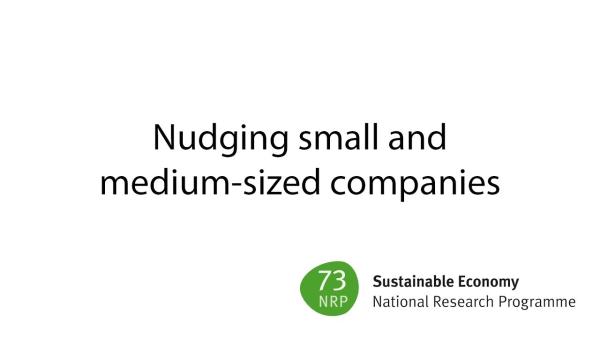Nudging small and medium-sized companies
Countering climate change requires behavioural change of all economic actors within societies. In Switzerland, SMEs make up 99% of companies and are thus a large group of resource consumers. We provide evidence showing that nudges can induce behavioural change in SMEs.

Background
Nudges (or choice architecture interventions) have been widely used to influence the behaviour of individuals, but research on whether nudging is also effective when targeting firms (such as SMEs), is scarce. Additionally, it is by no means obvious that the choice architecture tools that have proved to have an impact on individuals can also influence firm decision making, as those decision-making processes are very different.
Aims
An important goal of our project was to provide scientific evidence whether the behavioural nudging strategies that have been effective at the individual level also work at the SME level or whether and how they need to be adjusted. Additionally, our aim was to contribute to a better understanding of what drives environmentally relevant decision making in this large segment of the Swiss economy and how to better design and target policy interventions for firms in the future.
Results
Nudging SMEs can work in increasing resource efficiency
We study the direct effects of pro-environmental nudges on the behaviour of SMEs and consider what follows after a firm has been nudged, as well as whether there may be obstacles that prevent policy programs from unfolding their full potential. We thus provide a comprehensive understanding about the “nudging-journey” of SMEs and their employees in the domain of pro-environmental behaviour. In particular, we show that nudging SMEs can work and has the potential to increase resource efficiency in SMEs. Importantly, SMEs are not only motivated by the financial benefits of reducing the use of resources, but more importantly by doing good for the environment. We further show that behaviour can be substantially influenced by providing reference points of best performers, to which one can compare, which suggests that providing well-performing benchmarks can motivate firms to increase efforts to reduce resource use.
Positive spillovers to employee behaviour and minor obstacles
We also show that, because of positive spillovers from firm decisions to employee behaviours, the effects of successfully nudging SMEs into acting pro-environmentally are potentially larger than what can be assessed by measuring the effects of nudges targeted at firms alone. Moreover, we find that there is likely little to no backfiring of repeated campaigns appealing to pro-environmental behaviour. Minor obstacles (so called “sludge”), however, can prevent the success of nudges and the effectiveness of the underlying policy programs. Finally, we provide evidence on the effectiveness of two distinct ways for motivating employees to behave in line with firm objectives of pro-environmental behaviour: motivational messages and leading by example. Motivational messages are more effective with higher level employees and can backfire at lower layers in the organization. Leading by example, i.e., behaving in a way that is desired has the potential to motivate all employees.
Implication for research
We show that nudges can be applied to firms. This adds to literature on firm behaviour and to literature studying public policy. Adding to the latter literature, we show that repeated interventions likely do not backfire but show that `sludge’, i.e., small frictions in the design of policy programs, substantially reduces the success of policy programs. Showing that the corporate social responsibility (CSR) of firms affects employees adds to the literature studying spillover effects.
Implication for practice
Our studies provide public policy practitioners with valuable insights on the application of nudges for SMEs. To tackle climate change or, more recently, the energy crisis in Europe, firms need to adapt more environmentally friendly business practices. Knowing the barriers to the implementation of green business practices, how to nudge firms to behave more environmentally friendly, and who to target within a firm to succeed, helps practitioners to design policies, which reach the desired effect.
Publications
Project leaders
Dr. Jan Schmitz
Institut für Umweltentscheidungen, ETH Zürich
Project partners
Christian Wirz
Hochschule für Technik Rapperswil
myclimate
Stadt Luzern
Stadt Zürich





